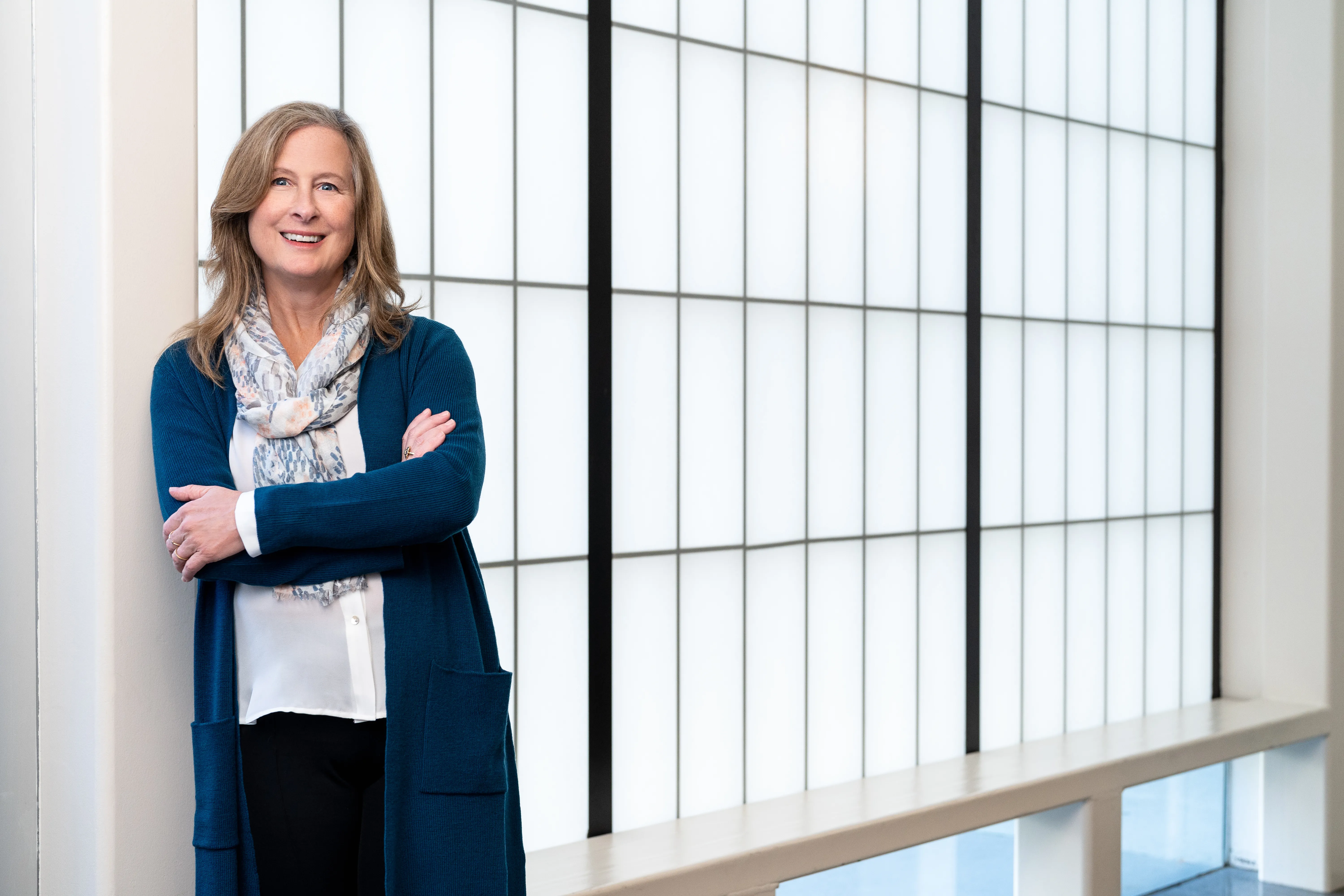Apple General Counsel Katherine Adams, ’90, Shares Career Advice with Corporate Lab Students

Katherine Adams, ’90, Apple’s general counsel and senior vice president of Legal and Global Security, joined the Kirkland & Ellis Corporate Lab for a lunch conversation on October 23 as part of the clinic’s ongoing speaker series. The series invites leading practitioners from a wide array of backgrounds to speak to students about various issues related to the intersection of law and business, supplementing the work that students perform within the clinic for real-world clients, such as Accenture, Google, IBM, Kraft Heinz, Nike, Owens Corning, and Sony.
Previous participants in the Corporate Lab’s speaker series include Andrew Boutros, partner at Shook, Hardy & Bacon L.L.P.; Brad Smith, vice chair and president of Microsoft; Eileen Kamerick, public company board member and consultant; Forrest Deegan, chief ethics and compliance officer of Victoria’s Secret & Co.; Mike Weitz ’11, managing director at Lazard; and Marcus Fruchter ’04, administrator of the Illinois Gaming Board. Other visitors to the lab include Burton Tansky, former chief executive officer of The Neiman Marcus Group; Michelle Browdy, former general counsel of IBM; and Stephen Ritchie ’88, former partner at Kirkland & Ellis LLP.
At this latest event, Adams shared lessons learned from her career, where she has worked in clerkships, at the Department of Justice, at a law firm, and as an in-house lawyer. She also offered reflections on the current state of the legal field.
She first advised students to take advantage of the broad array of classes offered at the Law School, emphasizing that her professors helped equip her with the skills needed to learn on the job. “What I remember most vividly from my time in law school is the quality of the teaching across the board,” she said.
Adams described how the intellectual rigor of the Law School prepared her for her first jobs out of law school—clerkships with then-Judge Stephen Breyer of the US Court of Appeals for the First Circuit and with Justice Sandra Day O’Connor.
She implored students who may be interested in clerkships to pursue the opportunity. “There is deep learning that occurs during a clerkship,” she emphasized. “A clerkship at any level in the judiciary is a great opportunity.”
Adams spoke to students about her work as an attorney in the Environment and Natural Resources division at the United States Department of Justice.
“In contrast to clerking, that was total chaos,” Adams said. “You are busy triaging with a stack of cases that somebody dumped on your desk and said, ‘good luck,’” she recalled.
Adams stressed to students that government work provides young lawyers an opportunity to take on a great amount of responsibility early in their careers.
She told students about her decision to join Sidley Austin LLP in New York City following her time in government, marking the first time she ever worked at a law firm. “The firms give you a level of training that you can’t get when you are not working on a team,” she told students.
Though Adams enjoyed her time at a law firm, she eventually realized that she was more interested in the work that her clients did.
In response to a question regarding when lawyers should think about pivoting from a law firm to an in-house role, Adams shared that there are “natural inflection points before going in-house becomes actionable,” suggesting students gain at least five years of experience before making the switch. According to Adams, the flat hierarchy of many in-house teams and the increasing complexity of the job description make prior work experience imperative.
“Though the theoretical responsibilities of in-house counsel are the same, in-house responsibilities have increased in scope and complexity truly exponentially,” she said. Over her career, Adams has observed an “Armageddon of change” in the role of the in-house lawyer.
“These jobs have gone from sort-of lifestyle jobs to the work being incredibly challenging, extremely interesting, and very demanding,” she explained, noting that though technology has automated some work, “the need for high-caliber depth of intellect has gone way up.”
Adams stressed to students that general counsel today “can’t get away with mono-chromatic advice.”
When asked about her favorite part of her job, Adams reflected that “working collaboratively with brilliant people is really fun.” But even more rewarding, she said, is the opportunity to mentor attorneys at earlier stages in their careers.
Coming up at the Corporate Lab Clinic
Several additional speakers are scheduled to speak to the Corporate Lab this year. Upcoming speakers include Bradley Blackwell, executive vice president and general counsel at Churchill Downs; Brian M. Resnick, partner at Davis Polk & Wardwell LLP; Hayley Hollender, partner at Kirkland & Ellis LLP; Jason Sussman, managing director at The Pritzker Organization; and Vincent Cordero, ’99, senior commercialization advisor at Defense Advanced Research Projects Agency.
In addition, three leaders of Meijer’s cybersecurity initiatives will present to the Corporate Lab on their work at Meijer: Brandi Van Leeuwen, associate general counsel; Jeffrey Nault, director of data science and AI; and Phillip Keibler, chief information security officer.
“I am very excited to hear from the great speakers we have planned for the rest of the year,” said Sam Cole, ’25, a student director of the Corporate Lab. Cole elaborated that “previous speakers have helped clarify how I think about my legal career and broadened my horizons about what positions are out there.”
Will Horvath is a member of the Class of 2025 at the Law School. He grew up in Northern Virginia and graduated from Yale University. At the Law School, Will is the managing student director of The Kirkland & Ellis Corporate Lab, the chair of the Eaton Award of the Federalist Society, and an online editor of the Law Review.